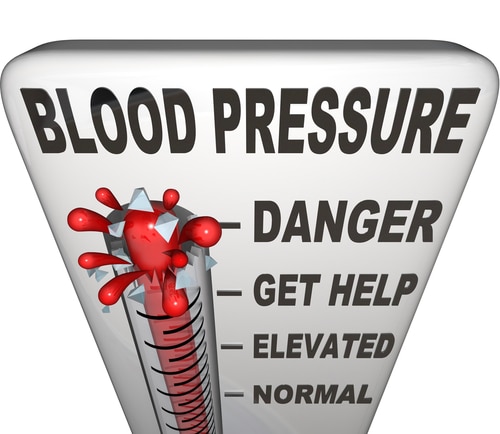 High blood pressure affects people of all ages but it becomes more of a problem as we grow older. Surprisingly, about a quarter of people over the age of 20 have blood pressure that’s high enough to need treatment. Even though there are drugs to treat hypertension, these medications have a number of side effects. Plus, some people don’t respond to blood pressure medications as well as they should. That’s why a number of people are looking for alternative, drug-free ways like exercise to control their high blood pressure. What impact do these drug-free treatments, including exercise, have on hypertension?
High blood pressure affects people of all ages but it becomes more of a problem as we grow older. Surprisingly, about a quarter of people over the age of 20 have blood pressure that’s high enough to need treatment. Even though there are drugs to treat hypertension, these medications have a number of side effects. Plus, some people don’t respond to blood pressure medications as well as they should. That’s why a number of people are looking for alternative, drug-free ways like exercise to control their high blood pressure. What impact do these drug-free treatments, including exercise, have on hypertension?
Reducing Hypertension Naturally: What Works?
In a new study published in the journal Hypertension, researchers looked at the effects of three alternative treatments for high blood pressure – exercise, behavioral therapies like meditation and biofeedback and interventions like acupuncture and relaxation techniques. To see what effect these treatments had they reviewed 1,000 studies spanning a five-year period that looked at natural therapies for high blood pressure
There was good news and bad news. Some of the natural treatments they looked at in this study didn’t deliver. These included yoga, relaxation techniques, and acupuncture. Transcendental meditation and biofeedback were better, although they only caused minor drops in blood pressure. The clear winner? Exercise.
Exercise and High Blood Pressure: What Kind is Best?
The researchers in this study looked at the effects of three types of exercise on blood pressure control – resistance training, aerobic exercise, and isometric exercise. The isometric exercises consisted of hand grip exercises while aerobic exercise was brisk walking.
Here’s the best news of all. All three forms of exercise were beneficial for blood pressure control. It’s not surprising that aerobic exercise showed benefits – a number of studies have already shown this. What’s more revealing is that resistance and isometric exercise helped too. In fact, isometric exercise was more beneficial for lowering blood pressure than aerobic workouts.
This comes as a surprise since straining to lift something, especially holding your breath while doing it, can cause a rise in blood pressure, at least temporarily. That’s why some doctors advise patients who have high blood pressure not to do isometric exercises, especially using heavy weights. Of course, the key to avoiding a sudden rise in blood pressure with any type of resistance exercise is to breathe while doing it and not hold your breath. Holding your breath increases intra-abdominal pressure. This can cause a sudden, sometimes dramatic rise in blood pressure. That’s why instructors always emphasize the importance of breathing.
Even though lifting against resistance can cause a temporary rise in blood pressure, other research supports its benefits for lowering blood pressure. A meta-analysis published in the journal Hypertension showed that resistance training modestly reduced systolic and diastolic blood pressure in adults. That’s good news since it’s important for older people, those most likely to have hypertension, to resistance train to preserve muscle and bone mass.
The Best Exercise Prescription for Lowering Blood Pressure
Aerobic and resistance exercise both appear to have blood pressure-lowering benefits. Aerobic exercise relaxes blood vessels by increasing the production of nitric oxide within the lining of the vessel. This helps them to expand more easily so there’ less resistance to blood flow. That’s one-way aerobic exercise lowers blood pressure.
Since both aerobic and resistance exercise help with blood pressure control, do both, but talk to your doctor first if you have uncontrolled high blood pressure. Even though brisk walking lowers blood pressure, there’s some evidence that more intense aerobic exercise has a greater blood pressure-lowering effect than lower intensity exercise – but there’s research showing you’ll get benefits from both.
Other Natural Ways to Lower Blood Pressure
Diet is a factor in controlling blood pressure too. Many doctors now recommend a DASH diet, short for Dietary Approaches to Stop Hypertension. This eating plan emphasizes vegetables, fruits, low-fat dairy, nuts, and whole grains and de-emphasizes foods high in fat, those sweetened with sugar and red meat. Fatty fish, a rich source of omega-3s, also appears to modestly lower blood pressure when you eat it at least twice a week.
By eliminating processed foods, you reduce the amount of sodium in your diet and avoid high-fructose corn syrup and trans-fats. These “ingredients” have been linked to an increased risk of heart disease in some studies. Of course, it’s important not to smoke, drink excessively, find effective ways to deal with stress and control your weight.
The Bottom Line?
Lifestyle changes including both aerobic and resistance exercise can modestly lower your blood pressure – by as much as 10 mm. Hg. If you have mild hypertension, this may be enough. In some cases, you may still require medication. Either way making the appropriate lifestyle changes will help you achieve better control of your blood pressure even on medications.
References:
Medical News Today. “Alternative Therapies May Help Lower Blood Pressure”
Hypertension. 2000; 35: 838-843.
The University of Colorado at Boulder. “Does Exercise Intensity Affect Blood Pressure”
University of Maryland Medical Center. “Omega-3 Fatty Acids”
Centers for Disease Control and Prevention
Related Articles By Cathe:
4 Things You Should Know about Exercising with High Blood Pressure
Does a High-Sodium Diet Increase the Risk of Heart Disease?
Non-Drug Treatments for High Blood Pressure: Which Ones Are Backed by Science?

